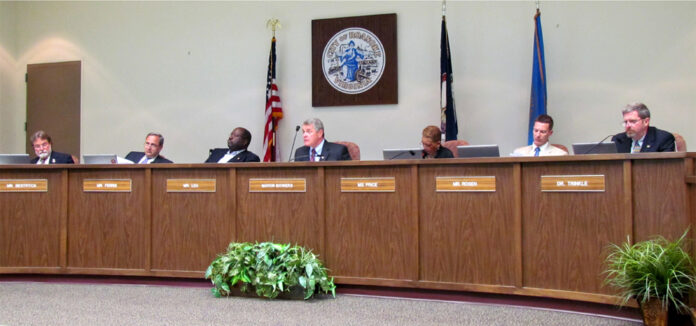
Changes to Roanoke’s pension plan will take effect July 1, 2014 and not everyone is pleased with the changes. Roanoke firefighter Lt. Rodney Jordan told council that staff had not done their due diligence. He said that there were 23 firefighters currently looking to leave the department.
Jordan and JJ Price said that Roanoke City had become the “training ground” for other localities and noncompetitive benefits and pay were the cause. Price claimed that compared to other localities Roanoke public safety was already 15 percent behind the Virginia Retirement System. Now, the city’s pension change will put public safety 27 percent behind Salem and Roanoke County according to Price. Jordan and Price also pointed out that there are 53 firefighters that are not vested – an indication that there is a problem with retention. They asked council to delay a vote on the new pension plan for 30 days.
Councilman Sherman Lea and Mayor Bowers were amicable to that but the three other council members, Ray Ferris, Court Rosen and Dave Trinkle were not. Anita Price and Bill Bestpitch were absent.
Morrill said that some cities have separate systems for fire personnel. The Roanoke Fire Department has one of the lowest turnover rates he said. “I recommend one retirement system.”
Director of finance, Ann Shawver said that she knew the hazard pay was less in the city but believed that with the 2.0 multiplier and public safety retirement age difference it made the city competitive with VRS. She said staff met with public safety leaders and all meetings were open to every employee.
Ferris said, “nobody’s calling anybody a liar … the money just isn’t there for a separate pension plan. We’ve got to be fiscally responsible here.”
Roanoke City has always fully funded its annual contribution to the employee pension plan. “We are not in a state of crisis,” said city manager Chris Morrill. But if changes are not made now in 15-20 years it could impact us he said.
“With some small changes we can ensure that we have employee retirement security. We can make sure we designed a system so that no current employees would be impacted. The needs of employees are changing.”
The city has a $300 million pension plan and is 86 percent funded. “We come from a position of strength,” said Shawver. It has been a two-year process that will result in a prudent long-term financial plan.
The pension supplement for health insurance to age 65 will be replaced by health savings plans for employees hired after July 1, 2013. The employee will contribute one percent of their salary to the health savings plan offset by a one percent raise. Cost of living adjustments for retirees will be based on a formula instead of ad hoc.
There is an optional hybrid plan for mobile employees that will be available July 1, 2014. Employees will contribute 5% of their salary either to the current Defined Benefit Plan or the hybrid Defined Benefit Plan/Defined Contribution Plan. Higher retirement ages and a lower multiplier will take effect in 2014.
The vote was unanimous to adopt the new pension plan.
In Other Business:
The 2012 Democratic National Convention will be held in Charlotte, North Carolina from Tuesday September 4, 2012 through Thursday September 6, 201 2. The Charlotte-Mecklenburg Police Department asked for security aid from the Roanoke Police Department and 20 other jurisdictions. Roanoke will send a detail of eleven officers, a sergeant and a lieutenant to assist. The officers will be trained and all expenses will be reimbursed to the city.
The bumpy Wells Avenue crosswalks next to the Hotel Roanoke will be replaced with stamped asphalt at a cost of $200,000.
A performance agreement was approved between the city and Roanoke River Associates, LLC. The 22 acres of property is located east of South Jefferson Street and adjacent to the Roanoke River and will be developed into a mixed use configuration containing commercial, office, retail, and residential buildings. The public infrastructure will be supported by an initial up-front economic development grant of $2 Million and subsequent annual economic development grants for Eligible Expenditures by RRA based on amounts equal to seventy-five percent (75%) of actual designated revenues received by the City from the Property.

